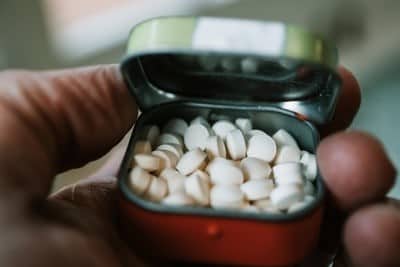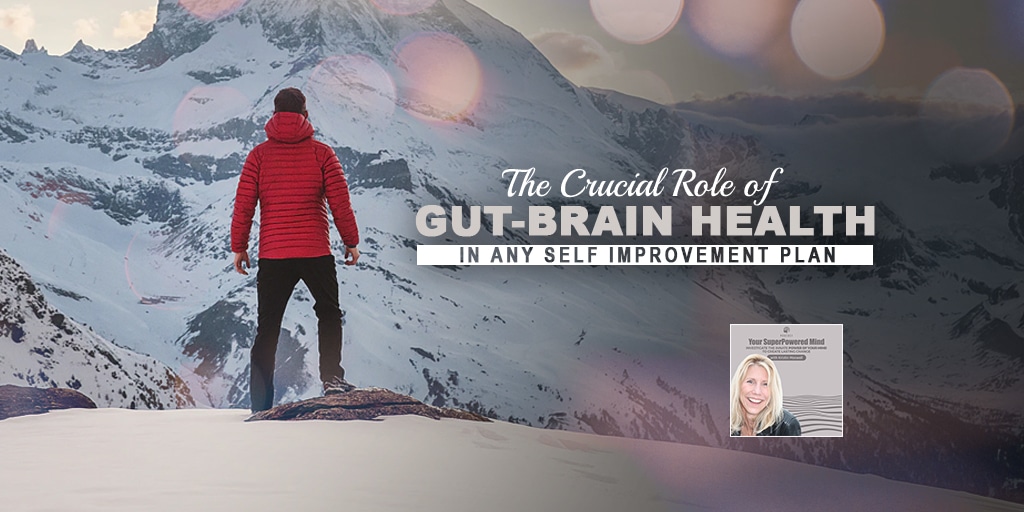
Hi everyone. Welcome to Your SuperPowered Mind. I’m your host Kristin Maxwell, and in this show we explore the process of transformation and give you the tools and strategies that you can use to transform your own life. Today we’re going to be talking to Dr. Achina Stein about why addressing gut-brain health is critical in any self-improvement plan. Dr. Stein is a board certified osteopathic physician who is also a psychiatrist. After working in mental health for over 20 years while also teaching as an associate clinical professor at Brown University, Dr. Stein shifted into functional medicine. Dr. Stein is now the co-owner of Functional Mind where she uses functional medicine to help patients find the underlying causes of illness and the nutritional and biochemical imbalances that contribute to them. Dr. Stein, welcome to Your SuperPowered Mind.
Thank you. Thank you for having me.

Well, the superpower that I uncovered, I guess is best explained that in order to heal the mind, you have to heal the gut.
I am very excited to share what you know about mental health and its connection with the gut. So I’m so glad to have you here. My first question is always, what superpower did you uncover as the result of mastering your mind?
Well, the superpower that I uncovered, I guess is best explained that in order to heal the mind, you have to heal the gut. That is something that I discovered, not necessarily for my mind, but for my son’s mind when I was practicing as a conventional doctor and he became very ill. He experienced a pretty severe depression overnight and couldn’t I really figure out why. After getting him to a psychiatrist and getting him treated and stabilized, I needed to figure out, “Well, why did this happen?” I was just floored by it because it just came out of nowhere.
I realized after doing research and talking to people and serendipitously coming upon a functional medicine provider, found out, long story short, that he ended up having some severe food sensitivities, particularly gluten, dairy and soy. His journey began by removing foods from his diet that ultimately started the journey to decreasing inflammation in his gut.
Once his gut started getting better, his brain started getting better. Consequently, he has done very, very well. He has not been on medications for a number of years. This happened back in 2010. So he’s been doing very well, very happy and off medications. So once I saw that, I just knew I had to do things differently. Because once you learn what you learn, you just can’t go back. That doesn’t mean to say I don’t practice conventional medicine. I do prescribe medications when it’s absolutely necessary. But I have more tools in my tool box now.
Right. That is truly amazing. One of the reasons why I’m so happy to talk to you is I’ve had some similar situations with my own family, with a child who was very depressed and had food sensitivities. I remember, because I have depression that’s always run my family, being floored that gut health and then also insufficiencies in supplements, or in certain minerals and all of that sort of stuff, could actually contribute to depression.
Absolutely. One thing that I discovered is what we call the five R’s. And you’re probably familiar with the five R’s. So removing what’s causing inflammation, replacing what’s missing from your body. Because when there’s inflammation in the gut, you’re not going to absorb all of the nutrients, vitamins, minerals, and phytonutrients that your body needs in order to function on a cellular level and do the work that it needs to do, particularly providing energy to all the cells, including the brain.
And then there’s inoculating the gut lining with probiotics and bringing the microbiome back into balance, and then repairing the gut after you remove the inflammation. So it’s like when the house is burning, you have to put out the fire first before you can start rebuilding.
So it’s really important to do. You could do all of those phases in concert or one after the other. But ultimately, you do have to go through all the phases. But the final phase is rebalance. It’s figuring out what went wrong in the first place that caused this to happen. And it’s really looking back at your history. It could be biological, psychological, or physiological. It could be a combination of those things come together that creates a perfect storm for people. So it’s really to rebalance and bring the body back into balance and in order to maintain whatever you’ve achieved through that healing process.
Yes. One of the questions that comes to mind then is we know we have all of the pills, Prozac and all of that stuff to help with depression and anxiety. How do they fit in with this addressing the system approach?
Well, a lot of times the people that come to see me have been on one antidepressant or another, a combination of medications. Either they get some relief or no relief, or that relief is not long lasting. Or they have side effects or both. The people that come to see me are the ones that really are trying to find other solutions other than taking medications. But they’re situations where medications do save lives. I can’t tell you how many times people have actually wanted to not take medications and have come to me. And we do this or that, the five R’s and try to address the stress. We address foods. We address chronic infections, stress and toxins and hormones. Sometimes those things don’t happen fast enough because these issues take time to uncover and address.
It takes months and sometimes years depending on how deep and severe and how long these problems have been going on. I am forced sometimes to start medications just to keep them functioning while we are trying to figure out the root causes and the underlying causes and bringing back the body into balance. Then once we do that, then we can taper them off medications as long as they do the rebalance phase and are mindful of the things that cause changes in their mood.

There is definitely a place for medications in acute situations, certainly if you’re not functioning and certainly if you’re having suicidal idealizations or psychosis.
There is definitely a place for medications in acute situations, certainly if you’re not functioning and certainly if you’re having suicidal ideations or psychosis. There have been times when I’ve had to use medications. I use them a lot less than I used to, but I certainly use them. So there is a place for medications in an acute process. But if you’re not acutely ill, then the functional medicine approach a wonderful approach. And some people can get well and as little as three months, even if they’ve been suffering for years.
Wow. That’s great. I really want to dig deeper into this because I think for some listeners this is going to be brand new, this idea of looking at the stomach health rather than just relying on antidepressants to combat things like depression and anxiety. But before we go to the break, can you let people know where they can learn more about your work and what it is that you do?
Sure, yes. I practice functional medicine in the state of Rhode Island. It’s called Functional Mind. And you can Google functional mind. I’m sure you’ll find us that way. But our website is fxnmind.com. I also have started an online health coaching program to dismantle depression just a couple months ago. And your listeners can link to that using the link. Go to the link, I guess in your pages, for the podcast to link on that and watch my free masterclass about dismantling depression. If they’re interested in joining the online program for treatment of depression, or I should say dismantling your depression. Can’t really treat people online, but they’re welcome to connect to me in that way as well.
Great. And I would love to learn some more about that when we come back. We’re talking to Dr. Achina Stein about why gut-brain health as a critical aspect of any self-improvement plan. Hang on and we’ll be right back.
To listen to the entire show click on the player above or go to the SuperPower Up! podcast on iTunes.
Podcast: Play in new window


